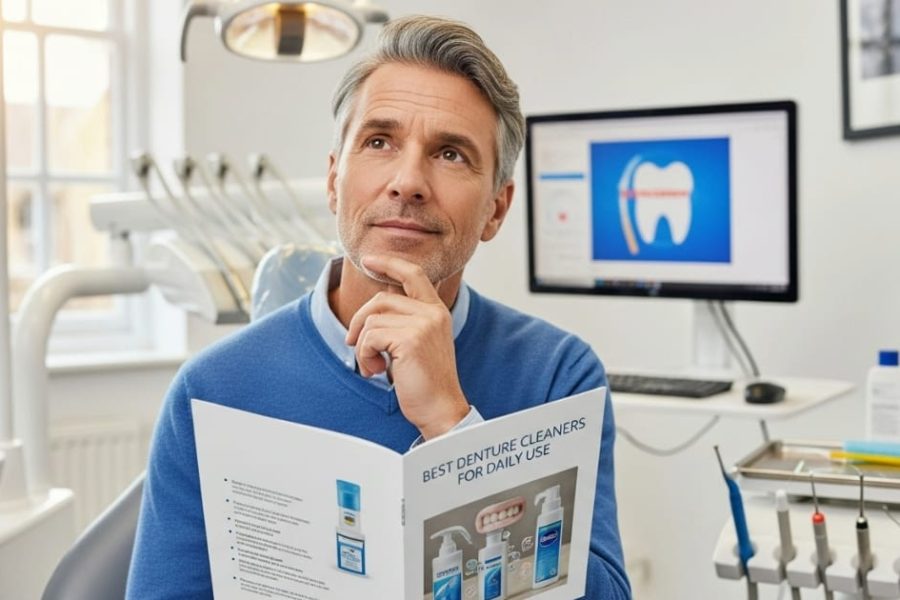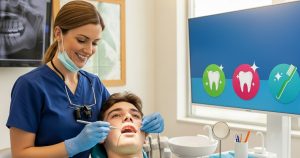Wearing dentures, whether full, partial, or implant-supported, is an excellent way to restore your smile and confidence. But like natural teeth, dentures require diligent daily care to prevent the buildup of plaque, tartar, and odor-causing bacteria. Failing to clean your dentures properly can lead to unpleasant breath, staining, and a common condition called denture stomatitis or denture sores.
Fortunately, today’s market is filled with the best denture cleaners for daily use. In this guide, we will review top-rated products and offer professional advice to provide you with the best methods and products available, ensuring your smile stays healthy, fresh, and bright.
Why Daily Denture Cleaning is a Health Essential
Daily cleaning isn’t just about freshness; it’s a critical health measure strongly recommended by major dental organizations. The American College of Prosthodontists (ACP) and the American Dental Association (ADA) both emphasize that dentures, whether partial or full, accumulate deposits just like natural teeth.
When food debris is left behind, it feeds bacteria and fungi, creating a harmful film known as biofilm. This leads directly to chronic issues like bad breath, permanent staining, and, most importantly, the risk of inflammation or infection, such as denture-related stomatitis on the gums. These conditions can lead to needing oral surgery if left untreated.
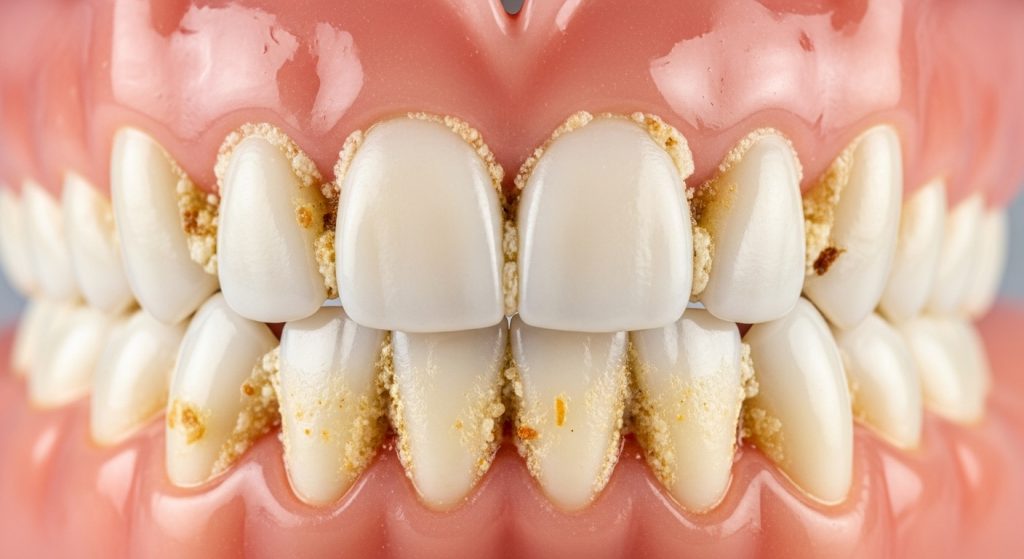
Furthermore, the surfaces that sit against your gums are especially prone to harboring deposits that reduce the appliance’s fit and comfort. With so many great, accessible care products available, the difference between a comfortable, hygienic appliance and a problematic one comes down almost entirely to a consistent daily clean-and-soak routine.
The Best Cleaners: Tablets, Pastes, and Machines Compared
Choosing the right cleaner depends on your denture type and cleaning preference. A combination of methods often yields the best results. However, these aren’t all the best denture cleaners for daily use!
| Cleaner Type | Best For | Key Feature/Benefit | Pro Tip |
| Effervescent Tablets | Daily soaking and sanitization | Kills 99.9% of bacteria; easy and convenient | Use for an overnight soak for best antibacterial action. |
| Denture Cleaning Paste | Manual brushing and plaque removal | Mildly abrasive; gentle on acrylic but tough on film | NEVER use regular toothpaste, which is too abrasive. |
| Ultrasonic Cleaner | Deep cleaning and hard-to-reach areas | Uses high-frequency sound waves to scrub tiny crevices | Run a cycle while soaking with an effervescent tablet for the ultimate clean. |
| Specialized Powder (Renew) | Stubborn stains, calculus, and tartar | Professional-strength deep cleaner | Use only as directed, typically once a week or as needed, not daily. |
In the following video, you can review 5 of the best denture cleaners, which were rated by people in 2021:
The Foundation of the Best Denture Cleaners for Daily Use: Effervescent Tablets
Effervescent tablets are the most popular and convenient form of the best denture cleaners for daily use. These cleaners work by dissolving in water to release active oxygen or antimicrobial agents that kill bacteria and lift stains without excessive scrubbing.
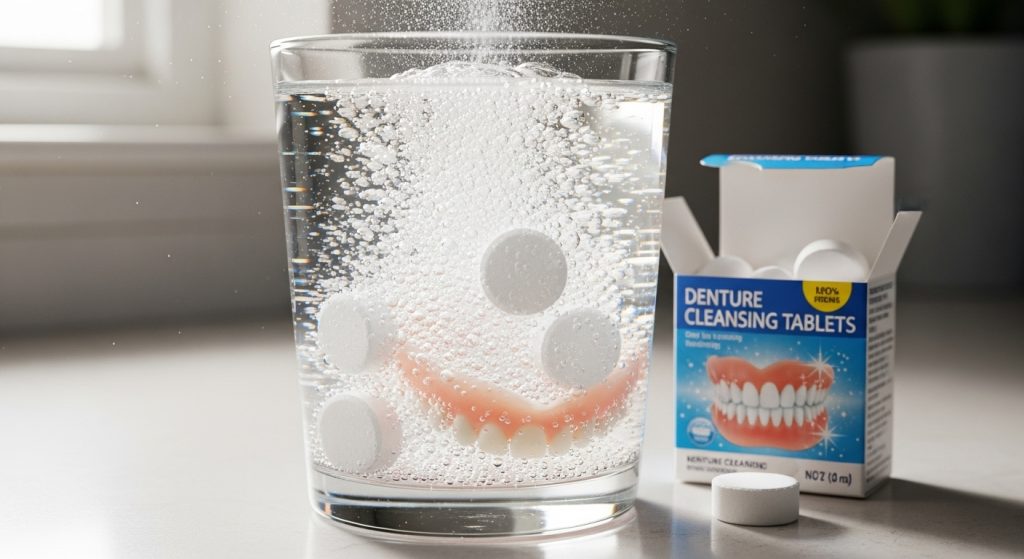
Some of the top-ranked products in this category are:
Polident Overnight Whitening Antibacterial Denture Cleanser, which was ranked as the best overall choice. It’s powerful, non-abrasive, and proven to kill up to 99.99% of odor-causing bacteria. This type of cleaner offers flexibility, working effectively in a quick 3-minute soak for daily refreshment or as an overnight solution for deep cleaning and whitening.
For users seeking fast results, options like Steradent Active Fresh offer rapid cleaning, removing bacteria and stains in just a few minutes. Budget-conscious users find great value in brands like Efferdent and various high-quality store-brand equivalents, which are still among the best denture cleaners for daily use.
How to Use Denture Cleansing Tablets Effectively
Pre-Clean: Always brush your dentures first using a soft-bristled denture brush and plain water to remove any loose food particles.
Soak: Drop one tablet into a glass of warm (not hot) water, ensuring the water fully covers the denture. Hot water can warp the acrylic material.
Time: Soak for the recommended time, which is typically 3 to 15 minutes or overnight, depending on the product.
Rinse Thoroughly: This is a crucial step! Remove the denture and rinse it thoroughly under running water before wearing it to remove any remaining chemical solution.
Contact Us for Help!
Are you looking into getting dentures or fixing your current ones?
Contact us to receive immediate care, the best cleaning treatment, and your smile back!
When You Need a Scrub: Manual Brushing Best Practices
While soaking is essential, some patients prefer a “hands-on” approach to cleaning. This requires a dedicated, non-abrasive paste.
Products like Polident Dentu-Creme are among the best denture cleaners for daily use, as they are specifically formulated with a mild abrasive that effectively removes plaque and surface stains while being gentle on the denture material. Using a soft-bristled denture brush with this cream provides the tactile satisfaction of brushing while protecting the acrylic from scratches.
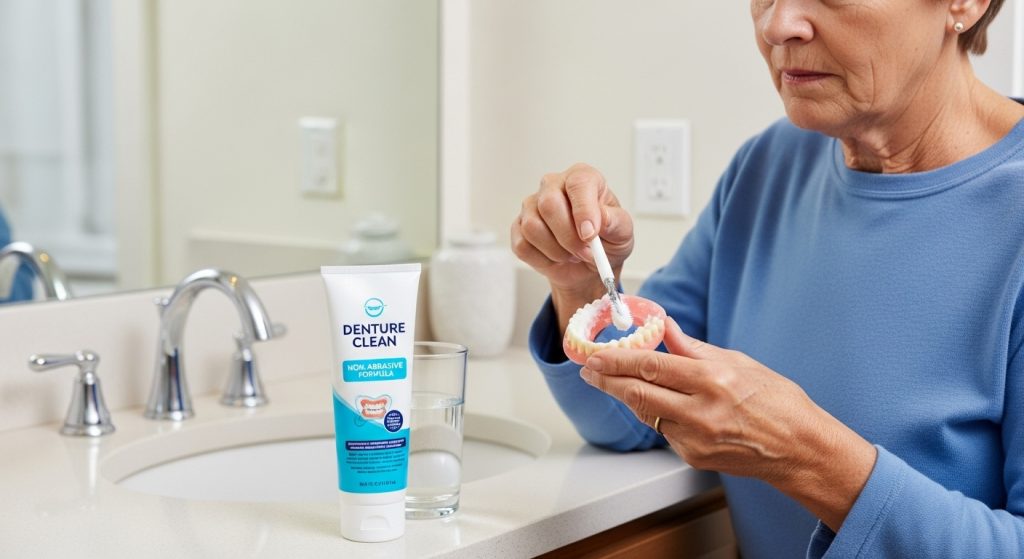
The crucial warning here is: Never use regular toothpaste to clean your dentures. Standard toothpastes are too abrasive and can create microscopic grooves in the denture’s surface. These tiny scratches become perfect hiding spots for bacteria, leading to faster plaque buildup, permanent stains, and even tooth abscess.
Specialized Care for Flexible and High-Tech Dentures
Not all dentures are the same, and some require targeted care. Flexible partial dentures (such as Valplast) and appliances like night guards or retainers need special attention. Dedicated formulas, such as FDC Flexible Denture Cleaner, are specifically designed to clean these materials effectively without causing warping or discoloration. These are typically used weekly, in addition to or instead of a daily non-specialized soak.
Remember the water rule: always use lukewarm or room-temperature water (never hot water) in your cleaning routine, as flexible materials are prone to warping.
For an unparalleled level of sanitization, especially for full dentures, the combination of an effervescent soak and an Ultrasonic Denture Cleaner provides the “gold standard.” These machines use powerful vibrations, often paired with UV light, to scrub and sterilize every surface.
Your Comprehensive Daily Routine
According to Mayo Clinic and dental experts, to maintain maximum hygiene, you can follow this straightforward daily cleaning routine:
Each day, after meals, rinse your dentures under running water to remove loose food debris. Use a dedicated, soft-bristled denture brush (not a standard hard toothbrush) and a denture-safe cleanser (paste, gel, or liquid soap); brush all surfaces, especially the underside where the denture contacts your gums.
After brushing, soak the dentures overnight in a denture-cleaning solution or plain water (if advised by your dentist) to keep them moist, maintain shape, and ensure hygiene. Avoid soaking the denture in hot water, as it may warp the material, and strictly avoid using regular toothpaste or household bleaches, as they may scratch or damage the acrylic.
Finally, in the morning, rinse your dentures thoroughly before inserting them. Also, remember to clean your gums, tongue, and palate using a soft brush or gauze, ensuring your entire mouth remains healthy and fresh.
Read More: Foods with Amazing Advantages for Your Oral Health!
Common Mistakes (and How to Avoid Them)
- Using regular toothpaste: Toothpaste often contains abrasives that are too harsh for denture acrylic and can lead to microscopic scratches where bacteria gather.
- Soaking in hot or boiling water: Heat can warp the denture base, affecting fit and comfort.
- Neglecting the fitting underside: The surface that contacts your gums often catches adhesive or food residues; ignoring it reduces comfort and hygiene. This can also lead to further problems, such as gum disease.
- Using bleach or unapproved household cleaners: These can discolour or damage denture materials and may irritate the mouth.
- Skipping professional check-ups: Even a well-cleaned denture needs periodic assessment for fit, wear, or material changes (especially important in older dentures). Neglecting the benefits of regular dental check-ups can lead to costly, painful consequences.
Expert Guidance on the Best Denture Cleaners for Daily Use
Choosing the best denture cleaners for daily use comes down to balancing convenience, effectiveness, and your specific needs. For most, an antibacterial effervescent tablet is the ideal daily foundation. Supplement this with a gentle denture paste for brushing, and consider an ultrasonic cleaner for superior sanitation.
Most importantly, remember the value of professional denture maintenance. Our team at Walk-In Dental Clinic offers comprehensive denture services, including professional deep cleanings, checks for proper fit, and expert hygiene advice. For local and specialist care, trust your smile to the professionals!
FAQ
-
Can I use regular toothpaste to clean my dentures?
No. Regular toothpaste contains abrasives that will scratch the surface of your denture. Always use a dedicated, non-abrasive denture paste or simply a soft brush and water.
-
How often should I clean my dentures?
Dentures should be cleaned at least once daily with a chemical solution (like an effervescent tablet) and brushed thoroughly. A quick rinse with water after every meal is also highly recommended.
-
Is it safe to soak my dentures overnight?
Yes, for most modern acrylic dentures, soaking overnight in a specialized solution or plain water is safe and beneficial. However, always check the product instructions, especially for flexible or metal-containing partials.
-
If I use an ultrasonic cleaner, do I still need tablets?
Yes, the best results come from using them together. The tablet’s chemical action kills bacteria, while the ultrasonic machine’s mechanical action physically dislodges and scrubs away stubborn plaque.
-
What if my dentures feel loose or uncomfortable even with good cleaning?
If dentures slip, cause sore spots, or you find you’re using adhesives more often, it may not just be about cleaning. It could be that the fit has changed, the denture is worn, or needs relining. You should see your dentist to assess fit and comfort.
-
How often should I replace the denture or have it professionally inspected?
The ACP advises that dentures should be evaluated by a dental professional for possible replacement when there’s chronic irritation, persistent adhesive reliance, or when the denture material is damaged or no longer fits well.
Have you ever struggled to choose the best denture cleaners for daily use? What type of cleaner do you prefer? Share your thoughts in the comments and join the conversation.

